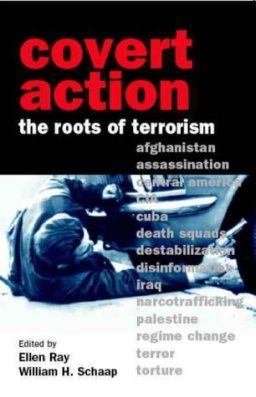Lobster Issue 47 (Summer 2004) £££
[…] the US/UK treatment meted out to Iraqis, we see the NATO alliance alive, enlarged and active in Asia; the UK Defence Secretary arguing for ever-larger arms and intelligence expenditure in line with the Pentagon’s; talk of the ‘war on terrorism’ is everywhere, with the British Home Secretary squeezing out long-established civil liberties, and prominent […]
Lobster Issue 19 (1990) £££
[…] text. In 1984 Crozier wrote to the Spectator attacking IPS director Richard Barnet (a former Kennedy aide) and accusing the IPS of being ‘a front for Cuban intelligence, itself controlled by the KGB’. Barnet sued, the litigation reaching a climax in 1986 when Crozier lost a key court battle to prevent the Spectator retracting. […]
Lobster Issue 31 (June 1996) £££
[…] 1995. It describes the internet and its potential as a tool for the DoD, both for gathering and disseminating information, for psy-ops and support of unconventional warfare. Intelligence source ‘The internet is a potentially lucrative source of intelligence useful to DoD’; e.g. information about the plans and operations of politically active groups. It can […]
Lobster Issue 38 (Winter 1999) £££
[…] told me the story himself very shortly after it had all happened (I was researching a doctorate at Birmingham at the time). The UK becomes a US intelligence target Of course the old undercurrents of distrust did not go away after the foundation of the wartime Anglo-American ‘special relationship’. There is an interesting snippet […]
Lobster Issue 9 (1985) £££
[…] about dealing with the unrest among the natives by the classic Imperial methods which had worked so well in Malaya against the Communist guerillas – a co-ordinated intelligence drive, a big propaganda campaign, mass round-ups of suspects, attacks on guerillas’ arms-supplies and cross-border sanctuaries – and then, if all else failed, negotiations from strength. […]
Lobster Issue 36 (Winter 1998/9) £££
[…] would be the key figure in arranging the formation of the CCF, and he is a good example of someone who moved easily between intellectual, political, and intelligence circles.(32) He came to prominence through his single-handed disruption of the German Writers Congress held in East Berlin in October 1947 by complaining about the lack […]
Lobster Issue 26 (1993) £££
[…] Schuster, London, 1993 For twenty five years Gary Murray worked as an RAF policeman and private investigator. In the early 1970s Murray ‘unexpectedly’ (invitation?) joined the Operations Intelligence cadre of 21 SAS, and this led to close contact with people from MI6, Army SIB, the Royal Military Police and the Parachute Regiment. In 1980 […]
Lobster Issue 5 (1984) £££
Extracts from what are claimed to be CIA analyses of Israeli intelligence services found when the US embassy in Iran was taken have been published in Imam, October 1983 through to May 1984. 17 pages in all. To this untrained eye they look genuine; ie dull enough to be genuine. There is nothing that […]
Lobster Issue 53 (Summer 2007) £££
[…] various neo-con and/or Israeli-supporting think tanks and action groups, notably the PNAC, had been pushing for more military action against Iraq; and the bits of the military- intelligence network in Washington under their control, such as the Defence Policy Board, within a week of 9/11 began planning how to use 9/11 as the pretext […]
Lobster Issue 32 (December 1996) £££
[…] of new material on the assassination of the sixties and related events. It contains pieces on William Pepper’s excellent book Orders to Kill (reviewed above); Garrison; military intelligence in Dallas; Cuban intelligence and JFK – the Cubans’ viewpoint; a report on the Coalition’s annual conference; updates on material generated by FOIA requests and by […]
